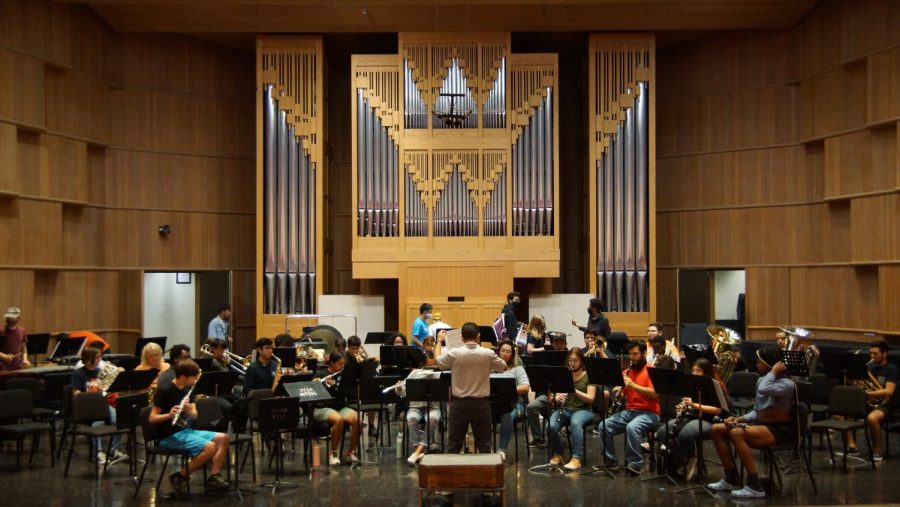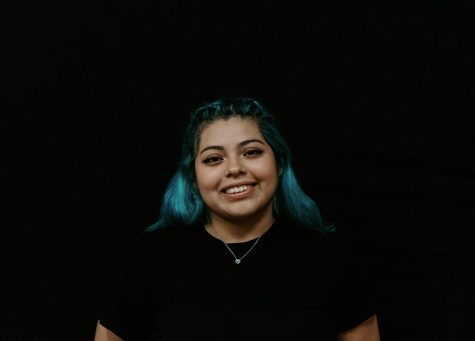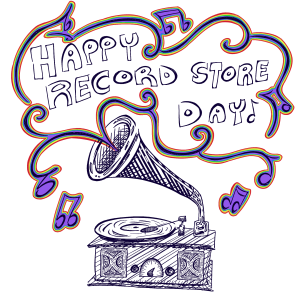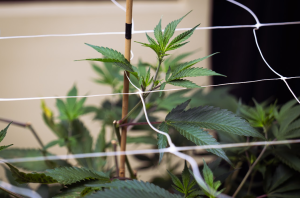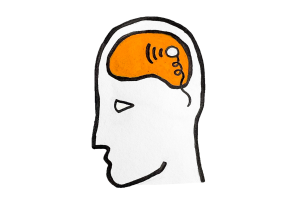Art and music majors – journey to campus
UTSA students share their online learning experience
Music majors rehearsing in the Recital Hall. Dustin Vickers/The Paisano
October 26, 2021
Art and music are two very interactive pathways, students majoring in these fields rely heavily on their peers’ feedback and the spaces provided by UTSA for inspiration and motivation — something many students seem to have lost since the pandemic first began and strictly online courses began to become a regular part of their lives. In addition, the lines that defined school and home were blurred when home was forced to become school, making students push boundaries and their creativity to produce their work.
When UTSA students came back to in-person classes after about a year and a half of online courses, there were definitely many thoughts circling everyone’s minds. Four students, Alex Valles (AV), a music composition major; Chris G (CG), an art major with a focus in photography; Joseph Peter Sanchez (JPS), fine arts major and Makenzi Costa (MC), a music education major, answered a few questions to let us dive into the experiences art and music students went through when they had to lose an integral part of their college education, people.
Q: What was it like being an art/music student during lockdown?
AV: It was complicated because some classes were enjoyed better because it was easier to sing in a room with our cameras off, mics off, and just hear one another through Zoom, which also made it difficult because it doesn’t make up for the real thing.
CG: It was both frustrating and unique; being an art major, you’re required to learn the history of art, and doing so during a time like this was super unique; it is frustrating because you’re restricted to one room, in my case, so you lack accessibility.
MC: Being a music student during lockdown was highly challenging. A significant part of why I personally decided to major in music was because I loved the performance aspect of music and playing saxophone. Unfortunately, with lockdown being in full effect, all performance opportunities were taken away.
Q: How did being in lockdown as an art/music student affect your work?
JPS: In terms of quality, I believe you can create better work and have a better work environment if you surround yourself with those who have the same interests or, in general, are encouraging. I’m one of the more creative people within the house I live in, so often, I can’t necessarily look to those at home for feedback. And with virtual classes, there wasn’t the dynamic of being surrounded by others with the same interests; you only saw and knew of them through your monitor.
MC: As a music student, it affected my work in both positive and negative ways. I’d say my work was impacted positively because I spent more time at home working on practicing my music and putting everything together. It was negatively affected because, as I’m sure most people have experienced, mental fatigue was at an all-time high. It felt difficult at times to put much mental effort into things as I did before the pandemic.
Q: Were there times when you felt discouraged or defeated with your work during lockdown?
AV: A lot of my peers, myself included, experienced this with their main instrument because it was just so hard to gain motivation to practice what you love; especially with private lessons, hearing feedback every week along the lines of, ‘I don’t know if you sound off or if it’s just the quality of Zoom;’ it affects your motivation.
CG: I know for me, by the second semester, I got pretty low with depression, and it honestly affected a lot of my work and I even had my professor concerned because they knew what subject matter I would shoot usually. As a photographer, before COVID, we had studio time with film photography. Then, we all switched to digital photography, which is great to learn too, but for me, it was like, “When will I have access to a photo lab again?”
Q: What were your initial thoughts when UTSA announced we were coming back to campus?
AV: I was nervous, a lot of my teachers were excited to come back, and I felt a little bad because I couldn’t share the same excitement; I know some of my friends got to come back in sort of a hybrid situation where only half their classes were in person, so it was a smoother transition whereas music students came back all at once, so I was nervous.
CG: When I first heard we were coming back, I was ecstatic; I just remember screaming with joy like: “Finally!” I think something people don’t realize with artists is we get feedback from each other very often. Being in the same room with another artist is so important because you can motivate each other. Input from other artists is just so monumental in developing your work. So I was just happy to be able to challenge myself again.
JPS: I remember thinking, “Oh man, here we go again.” I wasn’t taking in the information mainly as an art student. Looking back at it, it flew over my head just how much studio session time I did miss. Being surrounded by what you enjoy definitely elevates your habit of work and your overall engagement on projects.
MC: Overall, I was very nervous; since I’m a sophomore, I had yet to experience any normalcy of college and knew it would be a challenge trying to navigate it all. I was partly excited because I knew I would be able to begin making music in person again, something I had missed so much over the past year and a half.
Q: Since we are about two-thirds of the way through our first semester back in person, what is some advice you would give to other students who may be feeling the same way you did during the transition?
AV: I still had some really rough weeks where I couldn’t focus on my schoolwork, or I’d be too exhausted to keep working, and it was scary because I’m so used to getting good grades, so I’d say talk to your professors. They are very understanding and I had some even accommodate my needs. Don’t keep it in. That’s the worst thing you could do.
CG: I’d just say be careful. We’re back in person, but we’re still not out of the woods yet. It’ll be a struggle, but if you keep pushing yourself, you will eventually get where you need to be.
JPS: Stay committed and stay focused. If you’re genuinely passionate about art, your [attitude] towards your classes and work will be reflected into it. A quote comes to mind from Henri Matisse; “Creativity takes courage.”
MC: I’d say remember you are not alone in feeling stressed or overwhelmed with everything going on; take everything one step at a time and know there is always someone you can talk to.


